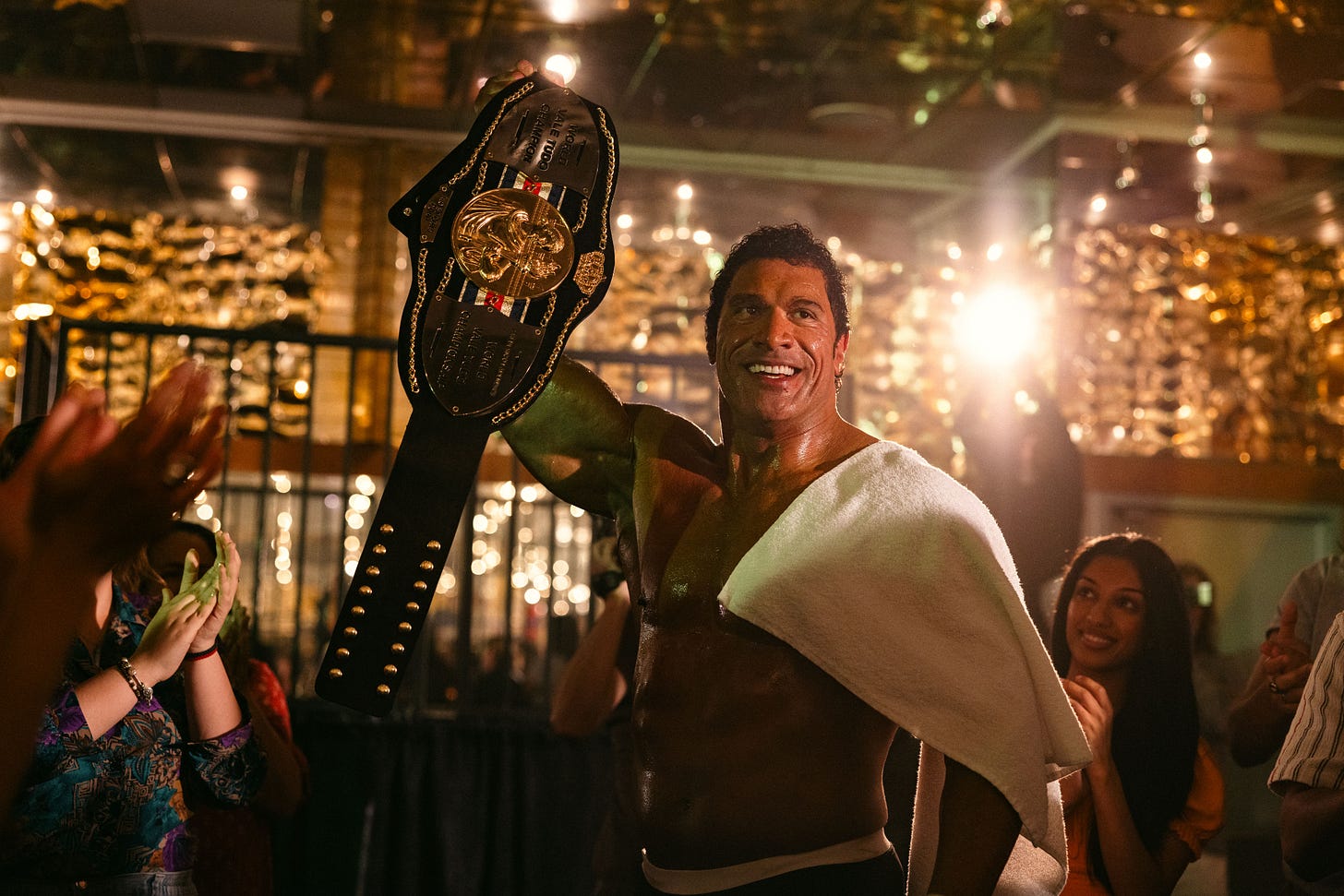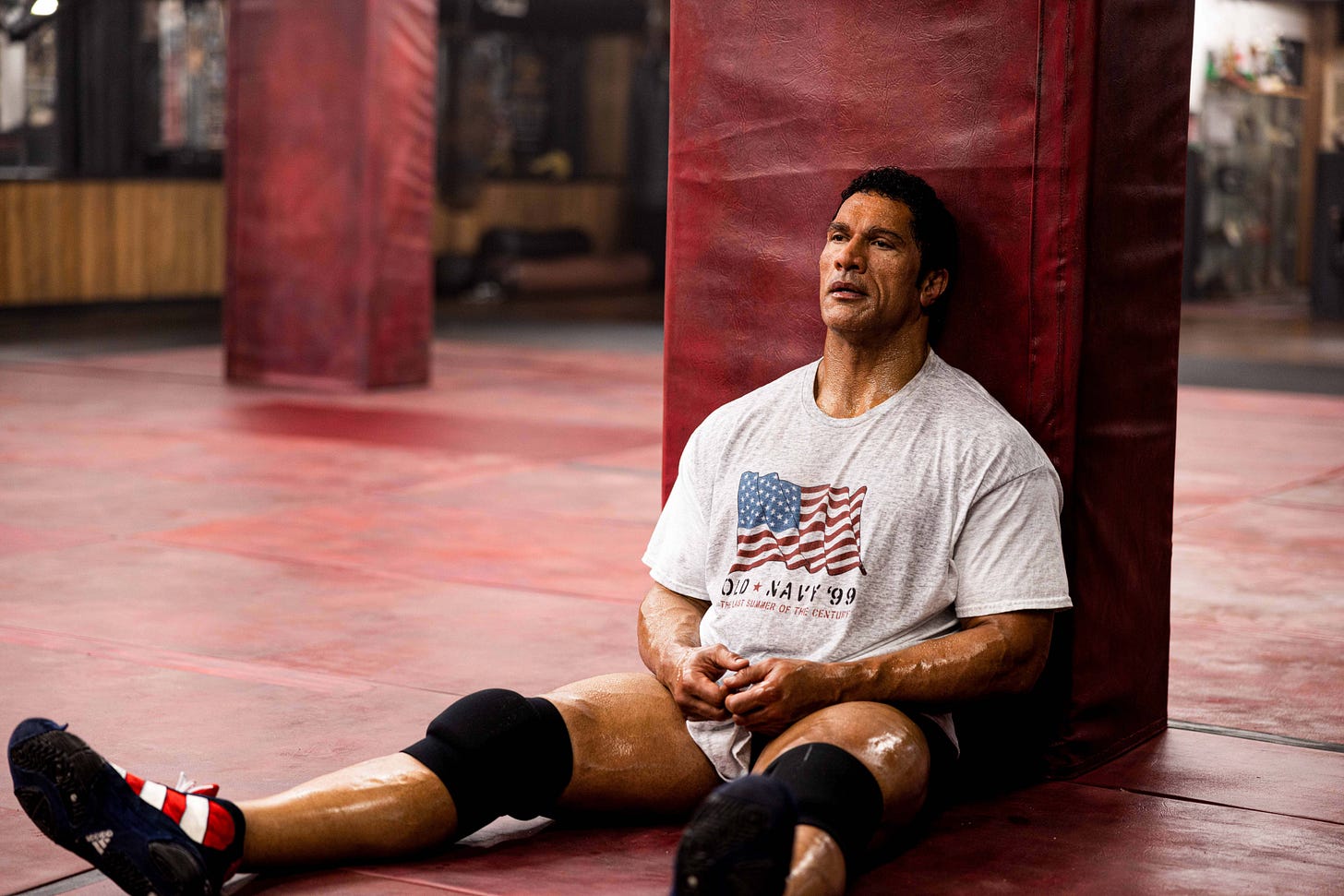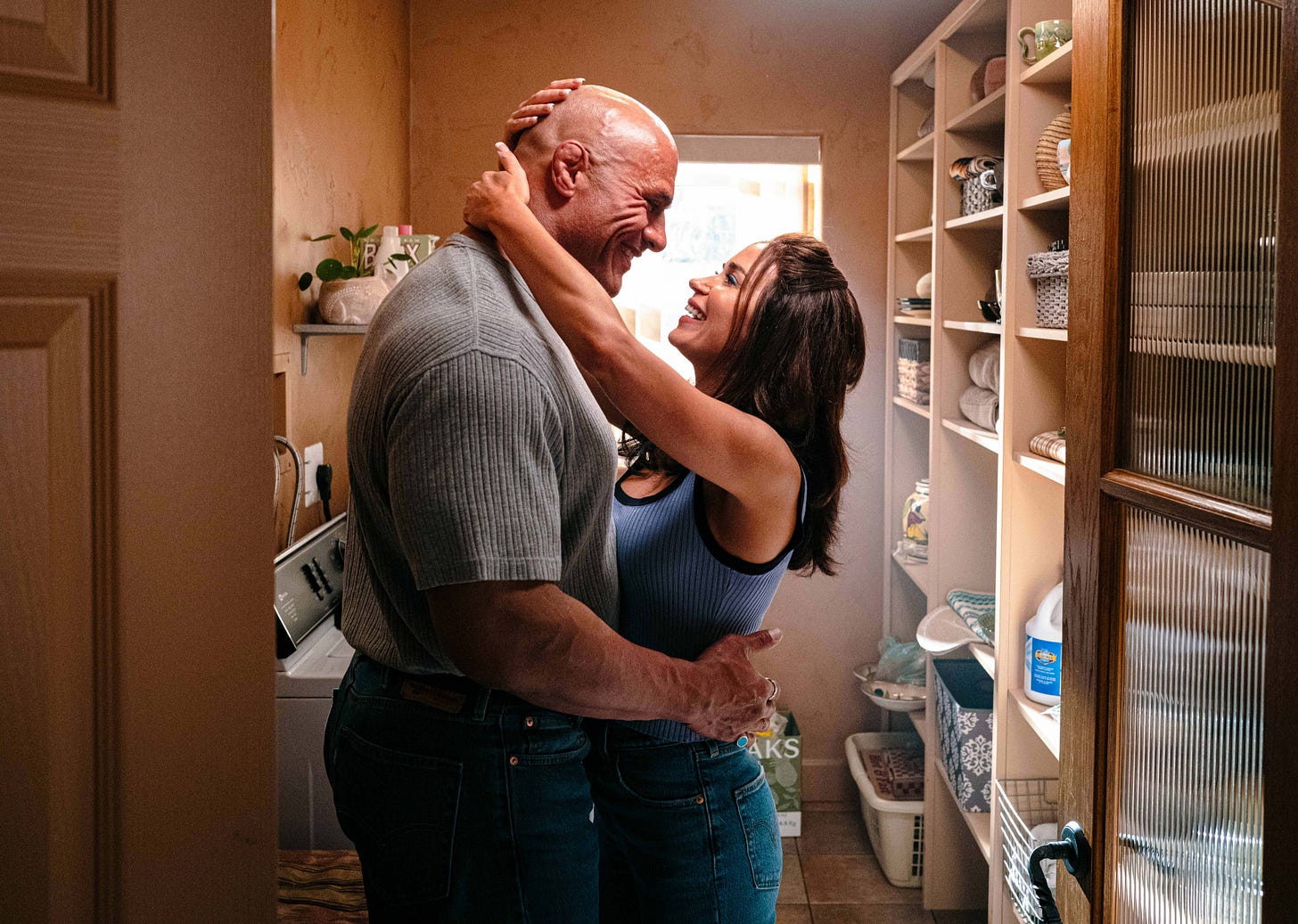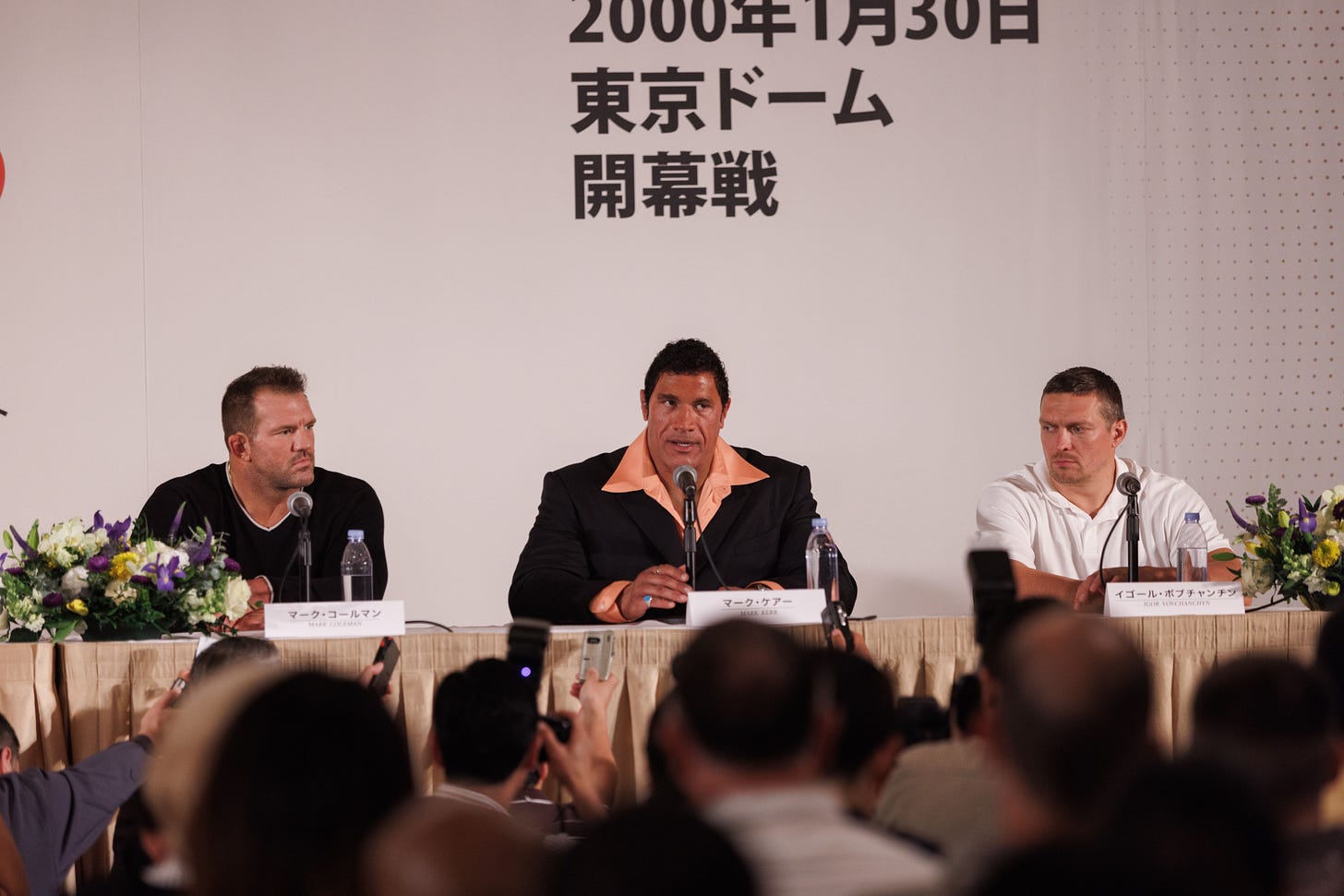I’ll preface this by saying that I don’t particularly care about MMA fighting. No, that’s not quite right. I actively dislike MMA fighting. I find the brutal violence off-putting. I don’t even particularly like boxing. I’m confounded by any sport where giving and receiving injury is the whole purpose. You don’t get extra points in hockey, for instance, for knocking out your opponent’s teeth. Figure skaters don’t aim to break each other’s legs — Tonya Harding scandal notwithstanding. So I’m not necessarily the target audience for The Smashing Machine. But as Roger Ebert once said, “It’s not what a movie is about, it’s how it is about it.” And much like KPop Demon Hunters, which was also premised on an area of pop culture I know little about, the framework and execution of this film were a pleasant, if imperfect, surprise.
Mixed martial arts is a competition that blends myriad fighting styles, from wrestling to karate to kick boxing. One of its pioneers was Mark Kerr (Dwayne Johnson), whom we meet in 1997 at the start of his career before flashing forward to 1999, at which point he’s still undefeated and already dating Dawn (Emily Blunt). It’s a smart move for writer-director Benny Safdie to elide how they met; it allows him to sidestep some of the relationship clichés we see in sports films. It doesn’t matter how they came together. What matters is how they are together. But more on that later.
Another potential cliché: Mark is addicted to painkillers after years of being punched, kicked, and body slammed for a living. But Safdie doesn’t focus on the details we most commonly get from such a storyline: no throes of withdrawal, no crying in therapy. A three-week stint in rehab happens entirely off-screen. Another smart decision. There’s even the Big Fight, where all of the film’s emotional stakes and relationships are bound to come to a head, right? Well, that doesn’t progress quite the way we expect either. Some of these excisions may be due to biographical details that defy traditional Hollywood formulas, but filmmakers usually have no trouble squeezing the lives of artists and athletes into the same restrictive templates, so Safdie is clearly making strong, deliberate choices about how to frame Kerr’s story. Some fans of sports films may actually be disappointed by the lack of familiar story beats — the B- Cinemascore from audiences suggests viewers didn’t quite get what they paid for — but I was refreshed by the film’s unique narrative focus.
So what is The Smashing Machine about, then? Well, for starters, it’s an examination of male ego. For a while Kerr’s is unperturbed, having not been challenged by a loss — in one interview scene he confesses to not even being able to conceptualize losing. That defeat does inevitably come, though, and it breaks him. His drug addiction spirals out of control, and his relationship with Dawn becomes especially strained — and that’s saying something. He just wants her to treat him like a man, he tells her, and he has tied his masculinity to his athletic prowess. Winning has become his identity, and he is lost without it.
The film is also about one hell of a toxic relationship. The long-suffering wife or girlfriend of an athlete who gets hurt for a living has been seen in many a sports movie — for instance, Renée Zellweger in Cinderella Man and Jennifer Morrison in Warrior. But the love story here is the opposite of a love story. Dawn is kind of a nightmare, actually, though the hard-headed Kerr often matches her aggressive energy. She feels neglected when he doesn’t include her in his athletic life. He resents her for popping Advils and drinking into the wee morning hours while he’s in recovery. Both want to be the main character in their relationship with the other in the long-suffering supporting role. Kerr’s friends don’t really seem to like Dawn all that much. If you have such friends, heed them.
Kerr’s relationship with Dawn may be even more toxic than his relationship with drugs, and she’s harder to kick — not knowing Kerr’s life story ahead of time, I wouldn’t have been surprised if the film ended in a murder-suicide, in either direction. That’s a fascinating dynamic for an ostensible sports movie and gives Blunt more to chew on as an actor. And boy does she chew. Hers is not a subtle portrayal by any means, but Dawn’s brand of self-involvement isn’t subtle either. Blunt gets to the heart of Dawn’s manipulations, instigations, and self-victimization. Johnson, meanwhile, flexes new dramatic muscles as Kerr. The WWE alum has always had larger-than-life charisma, but this role requires him to turn the dial down and capture the nuances of disappointment, yearning, and wounded pride. He’s playing The Rock if The Rock lost his mojo, and he seems entirely natural in this more vulnerable mode.
The narrative does feel disjointed at times, though. It’s introduced surprisingly late into the film that Kerr’s friend Mark Coleman (Ryan Bader) has his own MMA ambitions that could intersect with Kerr’s at a critical juncture. If you’re an MMA aficionado, you were probably already familiar with Coleman’s career, but in the film it plays almost like a side hustle, secondary to his job as a Kerr booster. There’s also a long stretch where Dawn is off-screen after an explosive argument only to return for an abrupt reconciliation, though I suppose that’s fitting given their erratic dynamic. And we get exactly one scene of Dawn’s life outside of her relationship with Kerr — celebrating the birthday of a friend she confides in but who is never seen again.
But at least the film doesn’t feel like it’s on rails the way so many sports movies do. I think it’s aspiring to be a character study in the same vein as The Wrestler. It doesn’t reach the same heights, but it’s a worthy goal — a big swing and a base hit, to put it in the terms of an entirely different sport. I guess in MMA terms it would be more like a big swing and a successfully landed punch in the head. It didn’t knock me out, but I’m gonna need stitches, which is a ... good thing? Sorry, the metaphor got away from me. The upshot is that I still don’t like MMA, but that didn’t stop me from liking The Smashing Machine.





